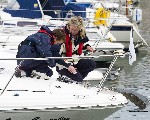 Go to main content
Go to main content
Archive Website of the UK government
Please note that this website has a UK government accesskeys system.
Main menu
Page menu
Travel and transport

How to prevent problems on board pleasure craft

Knowing what to do when things go wrong on board your pleasure craft can mean the difference between life and death. Find out how to prevent problems and deal with a man overboard and engine failure.
Be prepared and avoid accidents on board
Help to prevent things going wrong when using your pleasure craft by:
- planning carefully
- following the safety regulations
- making sure you carry the right safety equipment, it's in working order and everyone knows how to use it
Read the advice below and see 'Safety regulations for pleasure craft' for more information.
Dress for the conditions
 Lifejackets save lives!
Lifejackets save lives!
Make sure you and your crew wear a lifejacket at all times
Wear the right gear - a cold, wet crew won't be able to function properly. Choose clothing made of breathable fabrics - they trap warm air and will dry quickly if wet. Bright colours and retro-reflective strips are also useful.
Your outer layer should be designed for foul weather. To keep out water and wind and conserve body heat, wear:
- chest-high trousers
- a jacket with a high collar, hood and storm cuffs
- marine gloves - they will also protect your hands from rope burns
- thermal headgear
Wear the right footwear
Yachting boots will keep your feet dry and stop you slipping on the deck. Deck shoes also provide good grip when moving around - make sure they are waterproof.
Brief your crew
Tell everyone on board where safety equipment is stored and explain:
- how to use lifejackets and harnesses
- how to deal with flammable materials and when/how to turn off the gas
- what to do when mooring or anchoring
- how to operate the radio and send a distress alert
Know how to deal with sea sickness
Sea sickness can be dangerous if you become so ill you can't properly control the boat. You can be prepared by taking medication before you set off. Check the instructions on the medication for possible side-effects, which may include drowsiness. Keep some bread or plain biscuits and water on board to eat if you get sick.
If you're sick, don't hang over the side of the boat - use a bucket in the cockpit.
Knowing what to do if someone falls overboard
To prevent falling overboard:
- hold on to secure fixings on the boat, if you can
- avoid doing anything where you risk falling overboard, like taking a 'leak' over the side of the boat (use a bucket instead)
- wear a harness that's correctly clipped on to something strong enough to take your weight
Check your position and the length of the line when you clip on your harness. Make sure the line is not so long that you could be dragged into the boat's propellers if you fell overboard.
If someone falls off the boat, immediately:
- raise the alarm by shouting, "Man overboard!"
- throw a lifebuoy out to the person and a buoyant orange smoke signal - if it's daylight
- throw a lifebuoy with a light - if it's night and you have one
- tell a crew member to watch and point at the person in the water continuously
- alert emergency services
If you're the only one left on board, stay on deck so you don't lose sight of the person in the water. At night, you can use a white parachute flare (if you have one) to illuminate the area around the boat. It will also pick up any retro-reflective tape on the person's clothing.
If you can't see the person in the water, or have doubts about rescuing them, send out an immediate distress alert. If you recover the person overboard, tell the emergency services immediately.
If you fall overboard, stay calm and:
- shout or whistle
- activate your lifejacket
- face the boat
- activate any lights or beacons you have
- curl up to prevent losing body heat
What to do if your boat has engine failure
 Tips to prevent engine failure
Tips to prevent engine failure
To avoid engine failure, make sure you:
- check there's enough fuel before you set out
- do regular engine maintenance checks
A blocked fuel filter is a common reason for engine failure. The blockage will reduce power and make the engine stop. If this happens, change the filter and then try to restart the engine.
A blocked sea water inlet filter will cause rapid overheating and can cause engine failure. Check filters for blockage and then clear, if necessary. Make sure the pump is functioning and there aren't any leaks in the system.
What to do if there's a fire on board
If a fire starts on your boat, call the emergency services and tell them:
- your boat is on fire
- your position
- how many people are on board
Follow the link below for advice about preventing and dealing with fires on boats.
More useful links
Useful contacts
Additional links
Register your boat with the coastguard

Join HM Coastguard's voluntary safety identification scheme - if you get into difficulty, the coastguard will have information about your boat to help identify you
 Facebook
Facebook Twitter
Twitter StumbleUpon
StumbleUpon Delicious
Delicious Reddit
Reddit